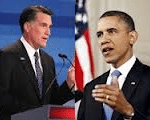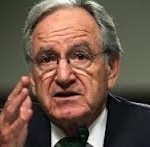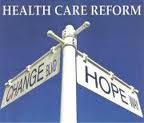![The 2012 Presidential Debates: When Moderators Aren’t Moderate]()
by | Aug 23, 2012
 Lost in the sea of coverage following Mitt Romney’s selection of Paul Ryan as his running mate, was the news that the moderators for the three Presidential debates, and one VP debate, were also selected.
Lost in the sea of coverage following Mitt Romney’s selection of Paul Ryan as his running mate, was the news that the moderators for the three Presidential debates, and one VP debate, were also selected.
There is a certain kind of news one receives that falls into the category of “this may or may not be bad—but it can’t be goodâ€. For Republicans, learning of the moderators that will be at the helm for these four debates certainly earns this distinction.
In order of appearance they are- Jim Lehrer (PBS News Hour), Martha Raddatz (VP Debate-ABC News), Candy Crowley (CNN), and Bob Schieffer (CBS News).
Since the Romney campaign had to sign off on each moderator, it is hard to imagine that they could not have demanded better (even given that the Obama camp also had to sign off on each). By any measure, Jim Lehrer, Candy Crowley, and Bob Schieffer all lean to the left, and the networks that employ them all trail badly in the ratings to their direct competition.
Even if you were to say that these three were the fairest that both sides could agree to, giving a green light to Martha Raddatz for the VP debate was certainly inexplicable. The reason for this being, she is a “foreign affairs correspondent†which is not Ryan’s forte, and in fact he was brought into the race for his economic mastery. One has to wonder how much focus will be put on non-domestic topics just based on her area of expertise. On the surface this seems a major concession to the Obama campaign, and one that needed not be given.
The reason these moderators are so important is three-fold. First, with all the polls showing that the election has a likelihood of being razor-close, every small detail that goes into them has a chance to be huge. Second, like was the case with the Republican Primary debates, these four showdowns will smash records for viewership and the audience will include millions of Independents sizing up the candidates for the first time. Lastly, and most importantly, the questions asked of the candidates have the ability to dominate the crucial weeks of news cycles leading up to Election Day.
So What Should The Focus Be?
Poll after poll shows that for the American people ground zero in this election is the economy. A Pew Research Poll taken from June 7-17 asked voters to name the top issue that they will be considering in the voting booth in November. The top four answers were Jobs (35%), the Budget Deficit (23%), Health Care (19%), and Social Security (11%).
The danger in having biased moderators was on full display for the Republican Primary debate moderated by George Stephanopoulos, when, seemingly out of nowhere, he felt the need to drill down with Mitt Romney and Rick Santorum on the issue of female contraception. This gave birth (no pun intended) to the Sandra Fluke phase of the campaign and a multi-week sidetrack by the media away from the serious issues of the day. There is simply no doubt that, should they choose to, a moderator can actively push the focus to issues that are not widely being considered by voters—and into territory that favors one candidate or another.
As will be the case in October, it just so happens that the issues voters themselves say are paramount are the exact issues that President Obama is desperate to avoid talking about. In theory this would make the debates a huge opportunity for Romney and Ryan to drive home their message—something tells me it won’t quite go down that way.
Perhaps I will be proven wrong, but will these moderators have the gumption to ask President Obama why a myriad of the promises he made while running in 2008 have been unachieved or even un-attempted? Will they remind the American people that twice the President had budgets voted on by Congress, and he failed to receive one solitary vote for either of them? Will they ask why he promised to cut the deficit in half but instead oversaw three years of trillion dollar plus deficits? Or will they inquire why he has not laid a plan on the table for reforming entitlements, after saying himself this was crucial in 2008?
Republican Are Right to Be Nervously Skeptical
All things being equal, and according directly to the polls, the topics discussed during all four of the debates should almost exclusively be jobs, the deficit, the long term health of entitlement programs, and foreign policy. What I fear instead is painful subjection to multiple questions on gay marriage, abortion, contraception, and student loan debt— knowing all the while the fruit is rusting on the vine.
It is true that the level of professionalism that the four moderators will show is yet to be determined, and perhaps at least three of them will be fair (I hold no hope for Bob Schieffer). But given the track record of behavior the major media outlets have shown to Republicans in recent years, I’d say a mildly-crippling nervousness is more than justified.
After all, barring a phenomenal performance by both Republican candidates, one thing is certain—“it may or may not be bad…but it won’t be goodâ€.
The post The 2012 Presidential Debates: When Moderators Aren’t Moderate appeared first on The Conservative Reader.




by Steven Waechter | Aug 7, 2012
 Our esteemed Senator Harkin has been holding some hearings on for-profit colleges back in D.C., and now he has penned an editorial for the Des Moines Register. In full disclosure, I dislike Tom Harkin. Intensely. Then again, back in 2008, Charles Grassley voted for the TARP bailout, and now I don’t like him either.
Our esteemed Senator Harkin has been holding some hearings on for-profit colleges back in D.C., and now he has penned an editorial for the Des Moines Register. In full disclosure, I dislike Tom Harkin. Intensely. Then again, back in 2008, Charles Grassley voted for the TARP bailout, and now I don’t like him either.
But, back to the junior Senator from Iowa; Senator Harkin penned an opinion-editorial decrying the high tuition, poor student outcome, and massive debt of the students of for-profit colleges. If somebody would be so kind as to pass this on to the right honorable gentleman, would Senator Harkin please explain why his criticisms of the for-profit colleges are not extended to all colleges? Why does the servant of the people limit his criticism to the obvious failures of the for-profit schools, and not touch upon the failures, just as obvious, of the Ivy League, non-profit schools, endowment liberal arts colleges, and even state schools?
I have three reasons which instantly spring to mind. First of all, Mrs. Harkin sits on Iowa’s Board of Regents. I don’t think Senator Harkin mentioned that; being a bachelor myself I’m only assuming that it would be appropriate to disclose that information.
Second, college professors and administrators appear to have privileged status in modern American society, and being part of the Nomenklatura (Russian for “Book of Names,†these were people who had earned favors from the members of the Communist Politburo), colleges can’t possibly be permitted to suffer the effects of a recession. After all, if your waitress doesn’t have a degree in sociology, how can we possibly have justice and compassion in our society?
Thirdly, and I think probably the most important, higher education is critical for the current political climate. We are in a deep economic depression and college is a useful way to keep young people busy. It gets them out of their parents’ houses, gives older voters the illusion that the young will be able to support themselves and fund the welfare state, and gives elected officials a ready-made line for why they need to be returned to office and why the public needs to turn over their wealth to the state -because children are the future, and we need to invest in our young people.
Political careerists have used that stupid old trope for decades now. We must, they tell us, rack up enormous debts – as a nation and as individuals – for the sake of the children, who will then grow up as serfs and endure an intense curtailment of their liberty and prosperity to settle the debts that we racked up for the sake of the children. It’s a bit like selling your car for gas money.
So, hurry up and enroll your kids in a state school, and make sure to cosign the Federal Stafford Loan promissory notes. Of course, you need to make sure you reelect your local deputies of the Supreme Soviet to make sure your kids can still get the chance to sign those promissory notes. Our economy, after all, is built on an Education-Employment model, where young people go to college so they can become more attractive to employers – employers who no longer have access to the capital they need to expand their businesses; considering that is where new jobs come from, that might be a bit of a problem – so unless your kids borrow money from the government to get an advanced degree, they might not get that job that doesn’t exist.
More than fifty percent of recent college graduates cannot find full time employment. All of them could get funding for a master’s degree if they really wanted it, though. It doesn’t mean anybody will have the capital to invest in employing them two or three years from now, but it will keep them busy and not officially part of the “unemployed.â€
So, there you have it; as long as federal money is being funneled to state schools to cover exorbitant tuition for degrees not worth the paper on which they are printed, our dear Senator doesn’t seem to mind. I actually agree with Senator Harkin when he condemns the for-profit colleges; but he attacks them for being for-profit, not for being useless. I attack them for being useless – the same sin committed by most every college and university in the country, regardless of who runs them.
No career politician has the courage to take on the real problems facing the American economy, so perhaps Senator Harkin doesn’t warrant extra criticism for his cherry picking and selective righteousness – he certainly doesn’t deserve any credit, either.

by | Jul 22, 2012
 While every Republican in Iowa has been wishing that Randi Shannon would withdraw from public view just quickly as she withdrew from the ballot 10 days ago–it appears this will not be the case.
While every Republican in Iowa has been wishing that Randi Shannon would withdraw from public view just quickly as she withdrew from the ballot 10 days ago–it appears this will not be the case.
Instead of going away quietly she has chosen to, of all things, go on a publicity tour to promote her appointment as “Senator” in a new government called “The Republic of the United States of America“. On July 13th she released a truly unbelievable letter detailing why she was dropping out of the Iowa Senate race to represent District 34 and joining this new alternative “union”.
The discussion she had with Ed Fallon recently is below (via The Bleeding Heartland), for an entertaining and jaw-dropping 15 minutes of video fast forward to the 10 minute mark and watch till around the 25 minute mark. This is one of the few times I have felt truly sorry for Mr. Fallon.
[wp-youtube]NsOvb0LTV2w[/wp-youtube]

by | Jul 19, 2012
 As the campaign manager for John Landon throughout the primary, I made a concscious decision to not write any opinion, analysis, or news pieces regarding this race on this site. With the conclusion of the primary coming at a special convention held last night at the Kirkendall library in Ankeny, this moratorium has now ended.
As the campaign manager for John Landon throughout the primary, I made a concscious decision to not write any opinion, analysis, or news pieces regarding this race on this site. With the conclusion of the primary coming at a special convention held last night at the Kirkendall library in Ankeny, this moratorium has now ended.
Per Iowa law, since none of the six Republicans on the ballot garnered 35% on June 5th the results were deemed “inconclusive” and this meeting of Ankeny area central committee members was called to decide the winner. Four of the six candidates who appeared on the primary ballot were nominated for consideration by the 21 members of the central committee who were in attendence.   What could have become a long and drawn out affair actually ended rather quickly, as the process took only two ballots to yield a decision.
Each of the four were given four minutes apiece to address the committee, which was followed by a secret ballot. All made their case by giving very good speeches, each of which centered around a very Conservative message. The first ballot of voting resulted in 10 votes for Landon, 10 votes for Matt DeVries, and 1 vote for Jim Robidoux. On the second ballot, Landon won by a count of 12-9 over DeVries.
After having gone through this campaign for several months now, I can say with certainty that all six candidates were worthy and qualified to represent HD 37, and I am left with a deep respect for all. Jim Robidoux (who finished with the most votes on primary night), Matt DeVries (who finshed in second), and Jeff Wright (who placed 4th on June 5th) are all assets to the Republican Party. I have little doubt that each will continue to be politically involved in Ankeny and will be heard from again on future election nights–which is a good thing for the Republican Party in Iowa.
Below is the full text of the press release issued by John Landon at the conclusion of last nights convention:
Every candidate in this race, including myself, made the decision to run for this seat in the belief that they were best qualified to represent and serve the people of our community. I was prepared to accept any decision the Central Committee made, and I am humbled by the faith and support that they have shown for me tonight.
For years I have been working to build and strengthen the Republican Party in this district, and I am greatly looking forward to continuing to advance our core principals of less taxes and more freedom in the State House next session. Though the sheer number of great candidates in this race led to a long and drawn out process, now that it is over I want the people of House District 37 to know that I am a rock solid, Conservative Republican who is energized and ready to fight for their interests in the legislature.
There is much work to be done, and my life experiences and long business career will allow me to start this work in earnest on day one. The Republican Party will win this seat in November and I look forward to casting the votes necessary to strengthen our state and create an environment that will allow all Iowans to flourish.

by | Jun 29, 2012
 Following the Supreme Court ruling upholding The Affordable Care Act, the financial fallout for the American people must be re-highlighted. We will have political analysis in the coming days, but for now here are the facts regarding the tax implications of this law
Following the Supreme Court ruling upholding The Affordable Care Act, the financial fallout for the American people must be re-highlighted. We will have political analysis in the coming days, but for now here are the facts regarding the tax implications of this law
Comprehensive List of Tax Hikes in Obamacare
Individual Mandate Excise Tax(Jan 2014): Starting in 2014, anyone not buying “qualifying†health insurance must pay an income surtax according to the higher of the following
|
1 Adult |
2 Adults |
3+ Adults |
| 2014 |
1% AGI/$95 |
1% AGI/$190 |
1% AGI/$285 |
| 2015 |
2% AGI/$325 |
2% AGI/$650 |
2% AGI/$975 |
| 2016 + |
2.5% AGI/$695 |
2.5% AGI/$1390 |
2.5% AGI/$2085 |
Exemptions for religious objectors, undocumented immigrants, prisoners, those earning less than the poverty line, members of Indian tribes, and hardship cases (determined by HHS)
Employer Mandate Tax(Jan 2014): If an employer does not offer health coverage, and at least one employee qualifies for a health tax credit, the employer must pay an additional non-deductible tax of $2000 for all full-time employees. This provision applies to all employers with 50 or more employees. If any employee actually receives coverage through the exchange, the penalty on the employer for that employee rises to $3000. If the employer requires a waiting period to enroll in coverage of 30-60 days, there is a $400 tax per employee ($600 if the period is 60 days or longer).
Combined score of individual and employer mandate tax penalty: $65 billion/10 years
Surtax on Investment Income ($123 billion/Jan. 2013): This increase involves the creation of a new, 3.8 percent surtax on investment income earned in households making at least $250,000 ($200,000 single). This would result in the following top tax rates on investment income
|
Capital Gains |
Dividends |
Other* |
| 2010-2012 |
15% |
15% |
35% |
| 2013+ (current law) |
23.8% |
43.4% |
43.4% |
| 2013+ (Obama budget) |
23.8% |
23.8% |
43.4% |
*Other unearned income includes (for surtax purposes) gross income from interest, annuities, royalties, net rents, and passive income in partnerships and Subchapter-S corporations. It does not include municipal bond interest or life insurance proceeds, since those do not add to gross income. It does not include active trade or business income, fair market value sales of ownership in pass-through entities, or distributions from retirement plans. The 3.8% surtax does not apply to non-resident aliens.
Excise Tax on Comprehensive Health Insurance Plans($32 bil/Jan 2018): Starting in 2018, new 40 percent excise tax on “Cadillac†health insurance plans ($10,200 single/$27,500 family). For early retirees and high-risk professions exists a higher threshold ($11,500 single/$29,450 family). CPI +1 percentage point indexed.
Hike in Medicare Payroll Tax($86.8 bil/Jan 2013): Current law and changes:
|
First $200,000 ($250,000 Married) Employer/Employee |
All Remaining Wages Employer/Employee |
| Current Law |
1.45%/1.45% 2.9% self-employed |
1.45%/1.45% 2.9% self-employed |
| Obamacare Tax Hike |
1.45%/1.45% 2.9% self-employed |
1.45%/2.35% 3.8% self-employed |
Medicine Cabinet Tax($5 bil/Jan 2011): Americans no longer able to use health savings account (HSA), flexible spending account (FSA), or health reimbursement (HRA) pre-tax dollars to purchase non-prescription, over-the-counter medicines (except insulin)
HSA Withdrawal Tax Hike($1.4 bil/Jan 2011): Increases additional tax on non-medical early withdrawals from an HSA from 10 to 20 percent, disadvantaging them relative to IRAs and other tax-advantaged accounts, which remain at 10 percent.
Flexible Spending Account Cap – aka“Special Needs Kids Taxâ€($13 bil/Jan 2013): Imposes cap of $2500 (Indexed to inflation after 2013) on FSAs (now unlimited). . There is one group of FSA owners for whom this new cap will be particularly cruel and onerous: parents of special needs children. There are thousands of families with special needs children in the United States, and many of them use FSAs to pay for special needs education. Tuition rates at one leading school that teaches special needs children in Washington, D.C. (National Child Research Center) can easily exceed $14,000 per year. Under tax rules, FSA dollars can be used to pay for this type of special needs education.
Tax on Medical Device Manufacturers($20 bil/Jan 2013): Medical device manufacturers employ 360,000 people in 6000 plants across the country. This law imposes a new 2.3% excise tax. Exemptions include items retailing for less than $100.
Raise “Haircut” for Medical Itemized Deduction from 7.5% to 10% of AGI($15.2 bil/Jan 2013): Currently, those facing high medical expenses are allowed a deduction for medical expenses to the extent that those expenses exceed 7.5 percent of adjusted gross income (AGI). The new provision imposes a threshold of 10 percent of AGI; it is waived for 65+ taxpayers in 2013-2016 only.
Tax on Indoor Tanning Services($2.7 billion/July 1, 2010): New 10 percent excise tax on Americans using indoor tanning salons
Elimination of tax deduction for employer-provided retirement Rx drug coverage in coordination with Medicare Part D($4.5 bil/Jan 2013)
Blue Cross/Blue Shield Tax Hike($0.4 bil/Jan 2010): The special tax deduction in current law for Blue Cross/Blue Shield companies would only be allowed if 85 percent or more of premium revenues are spent on clinical services
Excise Tax on Charitable Hospitals(Min$/immediate): $50,000 per hospital if they fail to meet new “community health assessment needs,” “financial assistance,” and “billing and collection” rules set by HHS
Tax on Innovator Drug Companies($22.2 bil/Jan 2010): $2.3 billion annual tax on the industry imposed relative to share of sales made that year.
Tax on Health Insurers($60.1 bil/Jan 2014): Annual tax on the industry imposed relative to health insurance premiums collected that year. The stipulation phases in gradually until 2018, and is fully-imposed on firms with $50 million in profits.
$500,000 Annual Executive Compensation Limit for Health Insurance Executives($0.6 bil/Jan 2013)
Employer Reporting of Insurance on W-2(Min$/Jan 2011): Preamble to taxing health benefits on individual tax returns.
Corporate 1099-MISC Information Reporting($17.1 bil/Jan 2012): Requires businesses to send 1099-MISC information tax forms to corporations (currently limited to individuals), a huge compliance burden for small employers
“Black liquor†tax hike(Tax hike of $23.6 billion). This is a tax increase on a type of bio-fuel.
Codification of the “economic substance doctrineâ€(Tax hike of $4.5 billion). This provision allows the IRS to disallow completely-legal tax deductions and other legal tax-minimizing plans just because the IRS deems that the action lacks “substance†and is merely intended to reduce taxes owed.
 Lost in the sea of coverage following Mitt Romney’s selection of Paul Ryan as his running mate, was the news that the moderators for the three Presidential debates, and one VP debate, were also selected.
Lost in the sea of coverage following Mitt Romney’s selection of Paul Ryan as his running mate, was the news that the moderators for the three Presidential debates, and one VP debate, were also selected.






